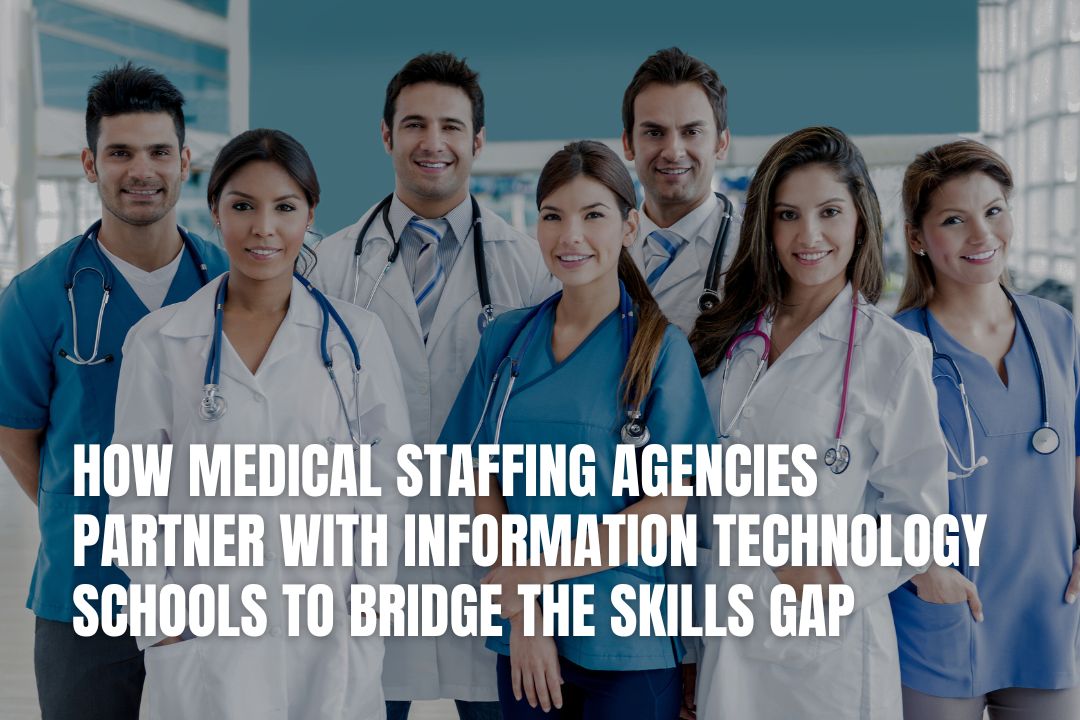
Information technology is becoming more and more crucial for many industries, and the medical industry is no exception.
From electronic health records and telehealth platforms to cyber security for patient records, IT in healthcare is a field that seems primed for exponential growth.
But how do information technology schools stay up to date on what fields of healthcare IT are in growing demand, and how do they ensure that their graduates possess the exact skillset that the market demands?
This is where collaboration between a medical staffing agency and an information technology school can be of great value to everyone involved. Many times, a medical staffing agency can suggest material that should be included in the curriculum because they see the same requirements from many medical centers and practices that are looking for IT staff with specific skills.
This is advantageous for the school in question because its students graduate ready to meet demands in the workforce, which in turn makes the school more attractive to future students. And it is also advantageous for the medical staffing agencies, since the more new graduates are ready-made with the skills that the market requires, the more client needs the agency will be able to fulfill.
What are the real outcomes of collaboration between medical staffing agencies and information technology schools?
There is nothing more discouraging than going into debt and spending years of one’s life in a degree program, only to graduate and be unable to find a job in your chosen field.
This is a common potential problem that students encounter upon graduation, and it is a true failing on the part of their educational institution.
When this happens, the degree program doesn’t just fail the student. They also failed the whole medical system, since the current climate of unmet needs means that all new graduates should go directly into the workforce and find immediate, needful employment.
But when schools collaborate with medical staffing agencies, these problems can be almost eradicated.
The medical staffing agencies advise which classes are needed to best meet the needs of each segment of the medical job market. In addition, career counsellors at the school can learn a lot from the staffing agencies–and provide information on how many grads may be available from each degree program, letting them plan for potential new talent entering the workforce.
As the medical system evolves, more and more collaboration between technology and clinical skill is needed.
When medical staffing agencies advise information technology programs, the medically-centred IT programs can emphasize the exact information needed in the workforce.
Whether this means training students in telehealth or providing cross-training in cybersecurity, the line between medical training and technology training becomes more blurred each year.
Some degree programs are offering certifications in IT specifically for current members of the workforce who were perhaps educated a decade or more ago and are struggling to stay abreast of the burgeoning technological needs of the medical industry.
These certifications make older healthcare professionals much more valuable on the current medical job market.
Across the country, many practices and hospitals face critical shortages of both clinical and technical staff.
This creates poor workplace conditions for the remaining staff, leaves technological vulnerabilities, and can ultimately lead to less-than-ideal outcomes for patients.
If IT schools succumb to inertia and keep training their students the exact same way year after year, medical practices will have an odious amount of work to do to bring new graduates up to date on modern technology use in the workforce.
The result of this is a reluctance to hire new graduates or graduates realizing that, instead of directly entering the workforce, they need to return to school for more training to get a job in their chosen field.
Meanwhile, existing staff burn out from trying to cover jobs that should be taken by new graduates while also trying to stay abreast of ever-changing technology.
But when staffing agencies inform the curricular selection of the IT programs, they can ensure that the skills employers need match up with the skills new graduates have, making it easy for graduates to transition directly from school to a position where they can make use of all the knowledge that their degree program imparted.
Freeing the school-to-workforce pipeline has vast advantages for educational institutions, medical centers, students, staffing agencies, and the economy at large. This is just one example of how industry can and should inform education, even as education shapes and informs the industry.
This partnership is vital because it aligns what you learn in school with the actual skills healthcare employers are looking for. It helps ensure that your education is relevant, which increases your chances of getting a good job quickly after you graduate.
You benefit directly by graduating with a skillset that is in high demand. This means less time searching for a job and a smoother transition into your career, as you will not need extensive on-the-job training to get up to speed.
If schools fail to adapt, their graduates may struggle to find work because their skills are outdated. This creates a skills gap, leaves critical healthcare positions unfilled, and can lead to burnout among existing staff who have to cover the shortfalls.
Agencies such as Attention Always have a direct view of the job market's needs. They can advise educational institutions on which technical skills, like cybersecurity or telehealth platform management, are most requested by hospitals and clinics, helping to shape a more effective curriculum.
Yes. The insights from staffing agencies can lead to the creation of specialised certification programmes. These courses allow you, as an experienced professional, to update your skills and remain a valuable asset in the ever-changing medical technology field.